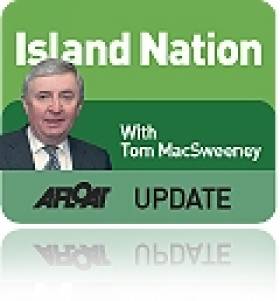Displaying items by tag: Ciaran Murphy
Sailing Body Challenges Government
The Irish Sailing Association has told the Government that Ireland is being left behind in marine development because of the way the State has neglected the maritime sphere. I applaud the national sailing authority for making it clear that while other countries are capitalising on their natural marine assets in coastal and inland waterways, Ireland is being left behind at a significant cost to the State in lost revenue and employment opportunities.
Irish sailors have raised the profile of the sport worldwide, the Volvo Race in Galway brought international attention to Irish sailing, but the Government has failed to capitalise on this sporting success. The ISA has offered a three-year development strategy to the Department of Transport, one of five Government Departments with marine responsibility.
"As we see a decline in some of the traditional marine-related industries," says the ISA, "there is an opportunity to develop the maritime recreational sphere, to grow and attract employment opportunities in rural areas that are struggling and bring significant national and international revenue if there is greater investment in marine leisure infrastructure."
Having been advised to do so at its national conference earlier this year, the national sailing authority has also reviewed its own operational structures. From next month it will put more emphasis on providing regional support for clubs and training centres, as well as improving communications with the membership.
Two Regional Development Officers have been appointed. Denis Dillon who has been Motorboat Development Officer is taking up the role of Regional Development Officer for the Southern Region. He will work with clubs, training centres, local authorities and local sports partnerships to increase interest in sailing. Ciaran Murphy is joining the ISA as his counterpart for the Northern Region which will include Dublin. Pamela Smithwick, who has been the ISA's "Women on the Water Development Officer," is taking responsibility for club membership and liaison. Rachel Solon, the Association's Training Administrator, has been assigned the role of Communications Officer.
Harry Hermon, ISA Chief Executive, anticipates the changes will "raise the profile of the sport, resulting in a significant increase in people participating in club and training centre activity. Our aim is to increase interest amongst the wider boating community and the general public."
The Association's strategy document tells the Department that more boating usage by the public should not be restricted by unnecessary regulations, which should only be imposed where "necessary, appropriate and enforceable."
While safety must always be uppermost in sailing, there does come a time when people must take responsibility to look after themselves. The Department has not helped the sport by regulation of short-handed, single-handed sailing in Irish waters, unique in world sailing and imposed without reasonable consultation.
It is good to see the ISA standing up for the sport and its document points to what I believe is a core problem ... "As there is no longer a Department of the Marine, we have in recent years seen marine leisure interests fragmented across different Government Departments which include, Transport, Sport and Tourism, Environment, Agriculture and Fisheries and Education. The result is that there is little or no co-ordinated strategy to promote or develop the sector.
"As an island nation we have undoubtedly some of the best coastline and waterways in the world. Where other countries are capitalising on their natural assets, Ireland is being left behind at a significant cost to the State in lost revenue and employment opportunities."
A greater political awareness of the potential of sailing as a significant contributor to the economic is needed. The ISA says this requires education and awareness programmes to raise interest.
These are good proposals but Departmental bureaucrats sitting on their fat salaries, behind desks which have never felt the roll of the sea, will not like being challenged, so they may ignore the ISA.
The full ISA submission is below as a downloadable PDF.
• This article is reprinted by permission of the CORK EVENING ECHO in which Tom MacSweeney writes maritime columns twice weekly. Evening Echo website: www.eecho.ie




























































